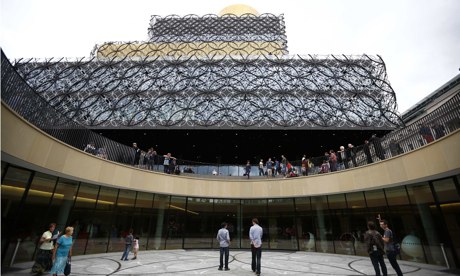by: Tim Vanson
 |
| The Library of Birmingham, which opened in August, has been heralded by Dutch architect Francine Houben as a 'people’s palace'. Photograph: Darren Staples/Reuters |
Architecturally daring and with a price tag to match, these ambitious constructions have popped up in Newcastle, Liverpool, Southwark and most recently Birmingham. They are symbols of urban prestige, which re-imagine the purpose and function of the traditional library on an impressively dramatic scale.
The Library of Birmingham, which opened in August, has been heralded by Dutch architect Francine Houben as a "people's palace" and it boasts a collection of over a million books, an array of digital facilities and the ability to accommodate up to 3,000 visitors. It also provides conventional library services, incorporates theatres, an exhibition gallery, photography and family history archives, music rooms, and services aimed at supporting local businesses, children, and young people.
Based on the building's dazzling exterior, state-of-the-art facilities, and fanfare which greeted its opening, it's tempting to conclude the advent of 'super-libraries' like Birmingham's, heralds a new golden age in the life of the humble institution.
But sadly, away from the glitz and the glamour, the prospects for libraries elsewhere in the country are much more sombre.
The number of people visiting libraries is in decline, and councils have been forced to make cuts, rationalise services, and divest assets. Rather than acting as an exemplar for what's possible, super-libraries have become shining examples of the growing inequality in the standards and sustainability of library provision across the country.
These inequalities are especially evident in rural areas, where pressures to rationalise library services are often greatest. In efforts to make their expenditure go further, many local councils have begun to centralise under-used services into multi-use hubs.
While understandable, the pitfalls of this approach mean that services can become less accessible, particularly for vulnerable and more socially isolated residents. With more and more local authorities poised to make changes along these lines, the emergence of a two-tier library system seems likely.
We should remember that libraries are an institution in transition, and that we are living in a time when the future of the library is still being debated and decided. The Victorian model we inherited was not designed to cope with the demographic, social, cultural and technological changes which are transforming the way people access and consume information. It's therefore vital that we create a positive vision for future libraries, rather than making changes on the back foot.
One important contribution to this goal is Arts Council England's recent 'Envisioning the library of the future' initiative, which OPM worked on. This large scale public consultation and research project affirms the value and importance of libraries in the 21st century but points to the fact that libraries have a multiplicity of uses, some of them seemingly contradictory, which must be balanced if libraries are to continue to meet the needs of citizens.
What is necessary for libraries to prosper?
1. Place the library as the hub of a community. In an age when people lead increasingly isolated lives and community assets likes pubs and post officers are under threat, there is an ever greater need for free and inclusive public spaces.There are also clear and compelling benefits when libraries share space with other community based services including skills exchanges, increasing footfall and making savings.
2. Make the most of digital technology and creative media Libraries must embrace rather than shy away from digital innovation – working to actively connect communities and helping to bridge the digital divide by supporting people's efforts to experience, experiment with and eventually master new technologies. But to do this they require local authorities and library services to create the necessary ICT infrastructure.
3. Ensure that libraries are resilient and sustainable. Libraries need to be able to draw on different sources of funding and other forms of support to supplement squeezed local authority budgets.
Furthermore, communities need to be more involved in the design and delivery of library services. Rather than being viewed as a cost-cutting tool, this should be seen as a normal way of working, with staff and users developing ideas and creating services together.
4. Deliver the right skills for those who work for libraries. Library staff need to be outward looking and active in their communities, encouraging people to get involved with their library and able to support people in using digital resources competently and confidently.
As well as developing new skills, library staff need to continue to provide well-managed and trusted collections which help to generate confidence in the resources, in contrast with the 'wild west' of the internet which can be difficult to negotiate and full of information from less trusted sources.
Tim Vanson is associate fellow at OPM Group.
from: Guardian
No comments:
Post a Comment